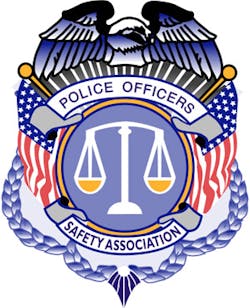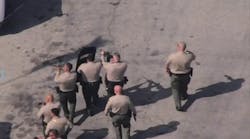I first got involved in police work back in the early '80s just as the officer survival movement was picking up a head of steam. In fact, it was the subject of officer survival that most appealed to me, coming as I did from a martial arts and firearms background. My conservative philosophical and political attitude was - and is - also well-attuned to the we go home at the end of the shift theme of the movement. I have very little sympathy for criminals or the foolish concerns of administrators that place liability concerns above officer safety.
Along the way, I learned that the authority of the police in a free society must be carefully circumscribed, lest we lose our liberties. I learned that some (not all, to be sure, and maybe not most, but some) of the difficulty that court decisions have placed on us as cops is actually for the good of American society in the long run. And I learned that there are rules we must play by if we are to be professional police officers, and not just Billy-Bobs with guns.
So it is ironic that as someone who's written hundreds of articles for the professional law enforcement press, and as a result is often best known as an advocate of realism in training and a hard-core approach to it, and as a proponent of aggressive tactics, I am writing this article criticizing some of the over-aggressive and unprofessional trends I and many others are seeing these days. Nonetheless, here they are:
Confusion with the military
We are civilians! Our job is civilian law enforcement. Yes, some of our tools and tactics overlap with the military's, but our mission, rules of engagement, risk management, and SOPs nonetheless differ considerably. There are any number of excellent ex-military instructors out there these days, teaching weapons and tactics. But as a very highly regarded Special Forces instructor - who for over 20 years has trained both front-line military units and national-asset anti-terrorist law-enforcement agencies - remarked to me, "So what if some guy is ex-SEALs or whatever? Unless you've lived civilian law enforcement, you can't appreciate the nuances of its use-of-force issues." The best ex-military instructors for cops are those that have taken the time to learn the civilian law enforcement job, and have even entered it.
Muzzle discipline
I was taught, both by my state and at the Smith & Wesson Academy, that the second rule of firearms safety meant just what it said. I was taught that we (generally) don't point guns at people we aren't in the act of shooting; if a gun needs to be pointed in their direction - perhaps to challenge them, it's generally with the muzzle depressed. But today we see cops routinely holding people at gunpoint - people who don't need to be shot right now - with the muzzle right on their chest. We see raids routinely conducted with muzzles high - despite the presence of children and innocents in the structure. There's now science to confirm the common sense notion that if we are startled, lose our balance, or are bumped, we can involuntarily convulse our gun hand and discharge our gun, even if our finger is off the trigger, and it actually happens on a regular basis. This, of course, is general rule, not a iron-clad rule for several tactical and biological reasons, I know, so there's a much longer 3-part article I wrote on the subject, with all the references, and with all the caveats at the link below.
Black BDUs
If I haven't made you mad by now, this might! Black BDUs make us look like storm troopers. Black is also not tactical as it doesn't conceal you very well in low light. Blue (or brown or tan or green) is the color of professional law enforcement. By outfitting your officers or tactical teams in blue, brown tan or green BDUs, you don't look like an occupying army, you don't look sloppy, and you don't look like you're ready to invade Poland - you look like professionals.
Chicks dig it stuff
We now see patrol rifles with flip-up/down sights, variable magnification optics, night vision, vertical fore-stocks, lasers, two white lights, an IR source and infrared optics. We see duty belts with a dozen items on it. And so on.
Dude, it's the shooter, not the tsochkes. Rob Leatham will shoot any course of fire with a perfect score in half your time with a box-stock gun. A federal agent friend of mine can out-shoot 99% of this site's readers with his stock issue Sig.
I appreciate what appropriate gear can do for you. It all has its place, to be sure. I own and use some of it. But a case of ammo and some practice time is often a wiser expenditure of money.
Using SWAT for non-SWAT stuff
I love SWAT. Agencies, without question, need SWAT capability. But we don't need SWAT to do stuff that regular cops can or should be able to do. I understand that the Chief may want to use SWAT for the occasional no-knock drug warrant, even though your narcotics detectives are fully capable of doing it, in order to give them some needed practice. But if, for example, you use SWAT to serve every felony arrest warrant, I'd call that overuse. In fact, Goggle "Fairfax SWAT shooting" to read about how that exact foolish policy led to tragic consequences. As members of the very community and free society that we serve and live in, we need to be as minimally invasive in it as we can and still be safe. We do what we gotta do, but we don't poke our sticks in the public's eye.
Heavy SWAT marketing messages
You can't market a normal law enforcement tool anymore. Look at every ad you see: everything is doused in the SWAT/Ninja/secret-squirrel/"first-tier operator" sauce. You want an ordinary flashlight? Or a plain-jane gun? What a wimp you are!
Think I'm blaming the manufacturers? Nope. Vendors do what sells. They respond to the public. These marketing messages are really a reflection of the mindset that their audience has, which in our case is too often a lot like a 13 year old who sooooo wants a toy.
All that cool stuff has it's place, I know. I like, and write about, and use, some neat gear. But at the end of the day, what I actually use on the street is pretty simple - high quality, yes, and new sometimes - but pretty simple.
Using "civilian" to describe non-cops
We're all civilians! For goodness sake, know the English language that we speak here in America. Referring to the public as civilians 1) shows abysmal ignorance, and 2) reflects an occupying army mind set.
Unprofessional instructors
A professional law enforcement instructor isn't simply someone who performs a skill, like shooting or DT or whatever, well. What makes him or her a professional instructor is that they also put the skills into a law enforcement context and they tell and show you how and when the skills are justified. They know and can cite relevant case law, both federal and state. They know what your local DA wants to see. Further, they don't just teach their stuff, they document it. Every lesson plan and everything taught in every class is described in detail, documented, and filed - all according to professional standards - so that it is available for the tenure of your career and beyond. Further, they know how to teach their subject and they care passionately about their students getting it.
A professional researches and keeps up with current best practices. A professional, by definition, is a member of a profession, and professions have bodies that further the knowledge of the profession. So unless, say, a force instructor is a member of and attends the conferences of bodies like IALEFI and ILEETA to keep their knowledge and techniques up to date, they can't really be called professionals. Good shooters or proficient DT practitioners maybe, or maybe even good teachers, but not professionals.
There are lots of places to learn, for example, shooting skills or DT skills. But if the instructor of them doesn't do all of the above, they are just a skills instructor. No more, no less. They are not professional law enforcement instructors, and the onus will then be on you to carefully dissect the skills you've learned from them and make sure that you throw out the stuff that's inappropriate for the job. That can be hard, because you don't know what you don't know. Don't get me wrong - outside instructors are great, and instructors from outside LE have contributed a huge amount to the skill set of the profession. But you can't just adopt wholesale what you are exposed to, no matter how much you've paid for a course, nor how impressive the credentials of the instructor are. We just can't adopt tactics and techniques from the military or competitive shooters whole cloth. We always have to thread the skills we learn through the civilian law enforcement needle.
Conclusion
There! There's my rant for the day. If you agree with me, my name is Ralph Mroz. If you disagree with me, my name is Frank Borelli, and hate mail can be sent care of this website. (Frank just loves when I do that)



